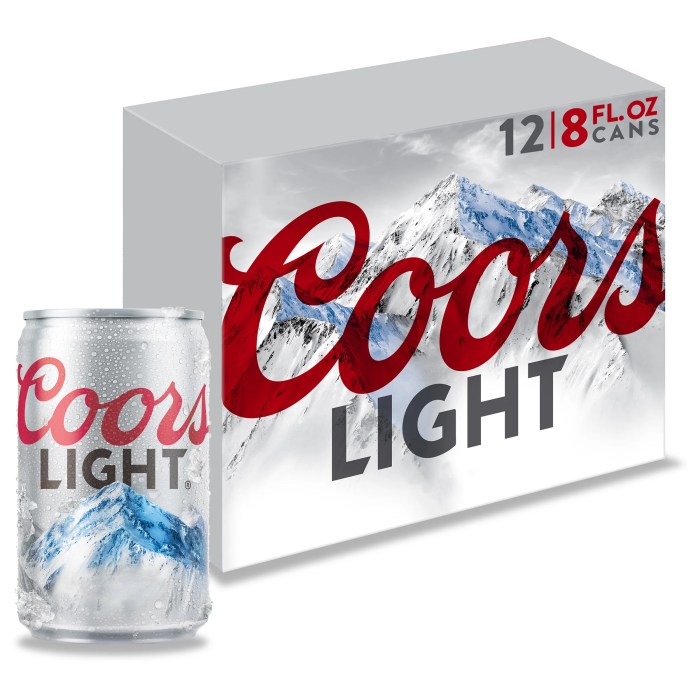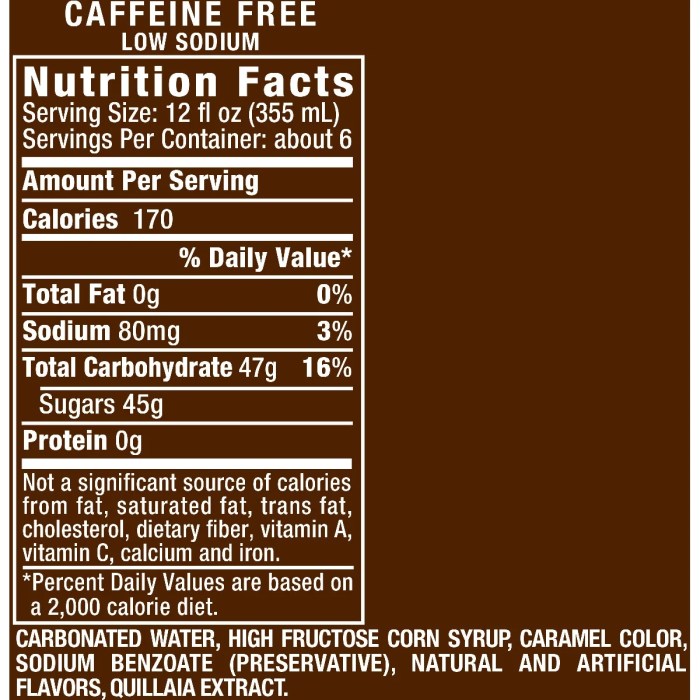Coors Light and Dietary Considerations

Coors light nutrition facts – Coors Light, like many light beers, presents a complex picture when viewed through the lens of dietary needs and potential health impacts. Its low-calorie and carbohydrate content make it attractive to some individuals managing their weight or adhering to specific dietary plans, but its alcohol content necessitates careful consideration of potential health risks associated with regular consumption. Understanding its nutritional profile within the context of various dietary restrictions is crucial for informed decision-making.
Coors Light and Specific Dietary Restrictions, Coors light nutrition facts
Coors Light’s suitability varies significantly depending on individual dietary needs. For those following a low-carbohydrate diet, Coors Light can be a relatively better choice compared to many regular beers due to its lower carbohydrate content. However, it’s important to remember that even small amounts of carbohydrates can impact individual metabolic responses. Similarly, Coors Light is generally considered gluten-free, though trace amounts may be present depending on the brewing process and quality control.
Individuals with celiac disease or severe gluten sensitivity should exercise caution and check the manufacturer’s information for specific details on gluten levels. A consultation with a physician or registered dietitian is always recommended for those with severe dietary restrictions.
Coors Light, known for its low-calorie profile, offers a different nutritional consideration compared to breakfast cereals. For instance, understanding the carbohydrate content in Coors Light is crucial for those watching their intake, unlike the complex carbohydrate profile found in, say, Cheerios; you can check out a detailed breakdown on the cheerios nutrition facts label to compare. Returning to Coors Light, its sodium content is another factor to keep in mind when assessing its overall nutritional value.
Health Implications of Regular Coors Light Consumption
While Coors Light’s lower calorie and carbohydrate count might seem beneficial, the regular consumption of any alcoholic beverage, including Coors Light, carries potential health risks. Excessive alcohol intake is linked to various health problems, including liver disease, heart disease, certain types of cancer, and mental health issues. The moderate consumption guidelines vary depending on individual factors and health conditions, but exceeding recommended limits can significantly increase the risk of these negative consequences.
Even moderate consumption can interact negatively with certain medications or pre-existing health conditions. Therefore, mindful and responsible consumption is paramount.
Comparative Analysis of Beer Options
The following table compares Coors Light to other beer options, highlighting variations in calories, carbohydrates, and gluten content. Note that these values are approximate and can vary slightly depending on the specific brand and brewing process. Always refer to the individual product label for the most accurate information.
| Beer Type | Calories (per 12 oz) | Carbohydrates (per 12 oz) | Gluten Content |
|---|---|---|---|
| Coors Light | 102 | 5g | Low (trace amounts possible) |
| Bud Light | 110 | 6g | Low (trace amounts possible) |
| Guinness Draught | 125 | 10g | Contains Gluten |
| IPA (Example) | 190-250 | 15-20g | Contains Gluten |
Potential Health Benefits and Drawbacks of Moderate Coors Light Consumption
It’s crucial to understand that any potential health benefits associated with moderate Coors Light consumption are primarily linked to the potential benefits of moderate alcohol consumption in general, not specific to Coors Light itself. Some studies suggest a possible link between moderate alcohol consumption and a reduced risk of cardiovascular disease. However, this association is complex and doesn’t negate the potential harms of excessive alcohol use.
The potential drawbacks, as previously mentioned, include liver damage, increased risk of certain cancers, and negative impacts on mental health. The risks significantly outweigh any potential benefits if consumption is not moderate and responsible. Furthermore, individuals with pre-existing health conditions should always consult with their doctor before consuming alcohol.
Coors Light vs. Competitors

Coors Light occupies a significant space in the light beer market, but its position isn’t solely defined by its own attributes. Understanding its competitive landscape, particularly in terms of nutritional content and marketing strategies, is crucial to grasping its overall market impact. A direct comparison with similar products reveals interesting nuances in the pursuit of a “lighter” beer experience.
Nutritional Profile Comparison
The following table compares the nutritional profiles of Coors Light with three major competitors – Bud Light, Miller Lite, and Michelob Ultra. Note that nutritional information can vary slightly depending on the source and batch. These values represent average figures commonly found on product labels.
| Brand | Calories | Carbohydrates (g) | Protein (g) |
|---|---|---|---|
| Coors Light | 102 | 5 | 1 |
| Bud Light | 110 | 6.6 | 1 |
| Miller Lite | 96 | 3.2 | 1 |
| Michelob Ultra | 95 | 2.6 | 1 |
Ingredient and Brewing Process Differences
Variations in nutritional content across these beers stem from differences in ingredients and brewing processes. The type and quantity of grains used, the fermentation process, and the addition of any adjuncts (like rice or corn) all significantly impact the final caloric and carbohydrate content. For example, Michelob Ultra’s lower carbohydrate count might be attributed to a higher proportion of adjuncts or a more efficient fermentation process.
The relatively consistent protein levels across these light beers suggest a similarity in the base malt used. Specific details on proprietary brewing processes are often kept confidential by manufacturers.
Marketing Strategies and Health Claims
Coors Light, along with its competitors, employs marketing strategies heavily focused on the “light” aspect of the beer. This often translates into advertising campaigns emphasizing lower calorie and carbohydrate counts compared to their full-bodied counterparts. However, explicit health claims are generally avoided due to regulatory restrictions. Instead, marketing focuses on associating the beer with a healthier lifestyle, often portraying active individuals enjoying the product.
Michelob Ultra, in particular, has leaned more aggressively into fitness and health-conscious marketing, positioning itself as a beer choice for health-conscious consumers.
Nutritional Information’s Influence on Consumer Choice
The nutritional information presented on beer labels directly influences consumer choices. Health-conscious individuals are increasingly scrutinizing these details, and the lower calorie and carbohydrate counts of light beers like Coors Light, Bud Light, Miller Lite, and Michelob Ultra are significant selling points. The differences between these brands, while subtle, can sway purchasing decisions, especially among consumers seeking to minimize their caloric and carbohydrate intake.
The success of Michelob Ultra’s marketing strategy highlights the growing consumer demand for healthier alcoholic beverage options, influencing the competitive landscape.
Question & Answer Hub: Coors Light Nutrition Facts
Does Coors Light contain gluten?
While Coors Light is brewed with barley malt, which contains gluten, the brewing process aims to remove most of it. However, it’s not considered gluten-free and may contain trace amounts.
Is Coors Light suitable for a keto diet?
It depends on your daily carb limit. Coors Light is relatively low in carbs compared to other beers, but its carb content still needs to be factored into your overall daily intake.
How does Coors Light compare to other light beers in terms of sodium content?
Sodium content varies slightly between light beer brands. It’s best to check the nutrition label of each specific beer for a precise comparison.
Are there any significant differences in the nutritional content between Coors Light and Coors Banquet?
Yes, Coors Banquet is a regular beer and will have significantly more calories and carbohydrates than Coors Light.
